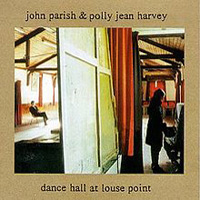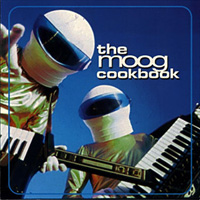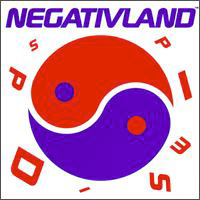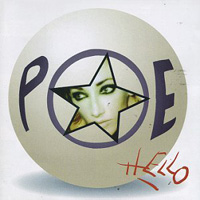 John Parish and Polly Jean Harvey
John Parish and Polly Jean Harvey
Dance Hall at Louse Point (Island)
by Nik Rainey
Over the course of three brilliant albums (not counting her four-track home recordings), PJ Harvey has etched one of the most indelible female personae in modern rock (which, in a pantheon that includes Tori Amos and Courtney Love, is really saying something). Few women have rewired the thrust-rumble of the classically masculine realm of blues-based rock to the fertile rhythms of the female heart as decisively, recasting the swagger in every emotional crack in her thin voice, each primal cackle of her spiky guitar, every enigmatic sway of her skinny English hips. The intensity of her vision is so compelling that even when diluted to half-strength, as when she lays her voice and lyrics over the melodic melodrama of musician/producer John Parish on their new collaboration, Dance Hall at Louse Point, it still rings loud and true, deliriously conflating Patti Smith and Carrie White.
Harvey and Parish have devised Dance Hall… as the basis for a projected dance production, and the twelve songs here (all co-written and produced by Parish and Harvey, save for the cover of Peggy Lee’s “Is That All There Is?,” where they’re joined by Bad Seed Mick Harvey) give Harvey room to flaunt her dramatic range, from chanteuse to shrew, wet with passion to dry with ennui. The bare-bones guitar instrumental “Girl” segues into the explicitly Bad Seedsesque “Rope Bridge Crossing,” where a simple brush-on-snare-drum rhythm and junkyard blues guitars halfway between Marc Ribot and Blixa Bargeld prop up Peej’s Cave-girl whispers (is my suspicion that Nick and PJ are a couple true? If so, could you imagine how pale and neurotic the kids would be?). From that foundation, Harvey and Parish run through a series of pieces that are less songs than cheap sonic thrills – the way PJ’s spoken declamations burst into a high, distorted keen fit to clear both the room and your sinuses in “City of No Sun,” the sudden shift from claustrophobic Lower East Side dissonance to wide-screen (Butch) vigor in “Urn With Dead Flowers In A Drained Pool,” or the mannered jump Harvey makes in “Taut,” describing a sweaty coital clinch in a ruffian’s car and then splitting for the ether with choir-girl cries of “Jesus save me.” And then there’s the aforementioned Peggy Lee cover, which has been unfairly maligned by many as an inappropriate choice for such a young, passionate singer. To me, it works – I advise all of the doubting critics to take a good, hard look at our new Lost Generation and tell me that premature Weltschmerz hasn’t begun to set in.
Is Dance Hall At Louse Point a great PJ Harvey album? No. It’s a little too brittle and slapdash, like many side-projects; one full-volumed listen to “50 Ft. Queenie” would blow this away like autumn leaves in a hurricane. But it isn’t an embarrassing chink in her armor – as an exploration of her great themes, namely the myth, magic and madness of the feminine mystique, it makes for a fine stretch before the next full address from the Chief of Distaff.



